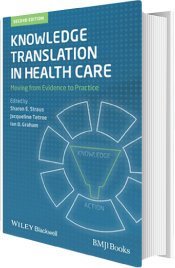Martin P. Eccles and Robbie Foy
Institute of Health and Society, Newcastle University
Download: Presentation (PDF, 197KB)
Introduction
- Health care professionals work within peer groups sharing common beliefs, assumptions, and groups norms
- Individual behaviour can be strongly influenced by these social factors
- Strategies of educational outreach, opinion leaders, and knowledge brokers are designed to achieve their effect by using the social influences and interpersonal relationships between health care practitioners
Educational Outreach Visits
What it is:
- A personal visit by a trained person to health professionals in their own settings
- Has been referred to as university-based educational detailing, public interest detailing, and academic detailing
Key principles:
- Surveys of practitioners to determine barriers to appropriate practice
- Development of an intervention to address barriers using simple messages
- Targeting of practitioners with low compliance
- Delivery of the intervention by a respected person
- Feedback on existing practice often included in intervention
Findings:
- Improvements highly consistent for prescribing but varied for other types of professional performance
- No compelling explanations for the observed variation
Opinion Leadership
What it is:
- The degree to which an individual can influence others’ attitudes or behaviour informally in a desired way with relative frequency
- Earned by technical competence, social accessibility and conformity to the system’s norms, not by formal position or status in the system
Characteristics of opinion leaders:
- More exposed to external communications
- Higher social status
- More innovative
- Unique and influential position in their system’s communication structure: at the center of interpersonal communication networks – interconnected individuals linked by patterned flows of information
Methods of identification:
- Sociometric: feasibility found to be variable across different professional groups and settings
- Informant
- Self-designating: effectiveness not rigorously tested in health care settings
- Observation
Findings:
- Opinion leader interventions produced small changes in compliance
Knowledge Brokers
What it is:
Knowledge brokering is “all the activity that links decision makers with researchers, facilitating their interaction so that they are able to better understand each other’s goals and professional cultures, influence each other’s work, forge new partnerships, and promote the use of research-based evidence in decision-making
Why:
- Poor linkages between researchers and policymakers
- Realization that research results should not be viewed as an end but a stage in a process
- Expectation that knowledge brokering will result in better incorporation of research into policy and practice
Findings:
- Much more recent so effectiveness unclear
Future Research
- Examination of the role of outreach visitors in a wider range of settings
- Identification of key attributes of clinician/team behaviours or contexts that lend themselves to the use of opinion leaders, knowledge brokers and educational outreach visits
- Clarification of the key conceptual attributes of knowledge brokers and their effectiveness
- Cost-effectiveness of each of these three interventions
Summary
- Opinion leaders and education outreach visits can produce small but worthwhile changes in health care professional behaviour
- Cost-effectiveness of these interventions is not well understood
- Effectiveness of knowledge brokers is less clear
References
- Mittman BS, Tonesk X, Jacobson JD. Implementing clinical practice guidelines: social influence strategies and practitioner behaviour change. Qual Rev Bull 1992:413-22.
- O’Brien MA, Rogers S, Jamtvedt G, Oxman AD, Odgaard-Jensen J, Kristoffersen DT, et al. Educational outreach visits: effects on professional practice and health care outcomes. Cochrane Database of Systematic Reviews 2007[4]:CD000409.
- Rogers EM. Diffusion of Innovations. 4th
ed . New York: Free Press; 1995. - Grimshaw JM, Eccles MP, Greener J, Maclennan G, Ibbotson T, Kahan JP, et al. Is the involvement of opinion leaders in the implementation of research findings a feasible strategy? Implementation Science 2006;1:3.
- Doumit G, Gattellari M, Grimshaw J, O’Brien MA. Local opinion leaders: effects on professional practice and health care outcomes. Cochrane Database of Systematic Reviews 2007;Jan 24[1]:CD000125.
- Innvaer S, Vist GE, Trommaid M, Oxman A. Health policy-makers’ perceptions of their use of evidence: a systematic review. J Health Serv Res Pol 2002;7:239-44.
- Lomas J. The in-between world of knowledge brokering.
BMJ 2007;20[334]:129-32.

